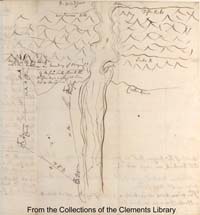Military Secrets
July 12, 1780 -- Benedict Arnold
to John André
 In this letter, Benedict Arnold provided
John
André and Sir Henry Clinton
with useful information about American troop movements and other
behind-the-scenes information. At the beginning of the letter, Arnold
also referred to previous information he had provided to the British at
the expense of General George Washington.
First, in a letter dated June 7, 1780, he had provided Captain Beckwith,
the aide to Lieutenant General Wilhelm von Knyphausen who commanded New
York when Clinton was in absent on other campaigns, with important information
about French involvement in the war. While dining with General Washington,
Arnold learned that 6000 French troops, led by the Comte de Rochambeau,
were going to arrive in Newport, Rhode Island to assist the American cause.
The Marquis de Lafayette, a French soldier and stateman who fought for
the Americans, had just returned from France and promised to loan more
French ships and troops to Washington. Second, Arnold also referred
to a false proclamation, which was engineered by Washington and Lafayette
to fool the British. Washington and Lafayette planned to deceive
Clinton by releasing a proclamation to the Canadians announcing that the
French and Americans would combine forces to attack British Canada.
The proclamation urged French people in Canada to join with the French
troops in the American cause against the British. Washington, trusting
Arnold, gave Arnold a draft of the proclamation to print and distribute
500 copies. Arnold sent one to a printer and another one to Joseph
Stansbury. Arnold’s close friendship with Washington yielded
much secret information for the British.
In this letter, Benedict Arnold provided
John
André and Sir Henry Clinton
with useful information about American troop movements and other
behind-the-scenes information. At the beginning of the letter, Arnold
also referred to previous information he had provided to the British at
the expense of General George Washington.
First, in a letter dated June 7, 1780, he had provided Captain Beckwith,
the aide to Lieutenant General Wilhelm von Knyphausen who commanded New
York when Clinton was in absent on other campaigns, with important information
about French involvement in the war. While dining with General Washington,
Arnold learned that 6000 French troops, led by the Comte de Rochambeau,
were going to arrive in Newport, Rhode Island to assist the American cause.
The Marquis de Lafayette, a French soldier and stateman who fought for
the Americans, had just returned from France and promised to loan more
French ships and troops to Washington. Second, Arnold also referred
to a false proclamation, which was engineered by Washington and Lafayette
to fool the British. Washington and Lafayette planned to deceive
Clinton by releasing a proclamation to the Canadians announcing that the
French and Americans would combine forces to attack British Canada.
The proclamation urged French people in Canada to join with the French
troops in the American cause against the British. Washington, trusting
Arnold, gave Arnold a draft of the proclamation to print and distribute
500 copies. Arnold sent one to a printer and another one to Joseph
Stansbury. Arnold’s close friendship with Washington yielded
much secret information for the British.
Arnold also provided some updated information about Washington's plans. He specified that Washington planned to join forces with the French and attack the British in New York. Indeed, Rochambeau landed on July 12, 1780, and Washington moved to join him on July 31 when he crossed the Hudson River at King’s Ferry.
In addition to intelligence, Arnold also hinted that he once he took command of West Point, he could supply even more useful services to the British. This story unravels in the next letter. As a commander of West Point, he suggested how he could communicate with British officers without anyone detecting that he was a spy. A British officer could voluntarily be taken prisoner, brought to West Point for Arnold, then released on parole so that the officer could take information from Arnold back to the British.
The final parts of the letter hint at Arnold’s
motivations for betraying the American cause. He disclosed his general
feeling about the impact of the war on American resolve and morale.
He thought that Americans were tired of the war and would give up soon
if they did not see any substantial benefit. He thought that
the last few struggles were futile and showed American weakness and discouragement.
Furthermore, Arnold again emphasized that he expected substantial and urgent
payment for his services.
Previous Story |
Next Story |
![]()
|
|
|
|
Letters | Stories | Methods | People | Routes | Timeline | Home
Clements Library | Sir Henry Clinton Collection | Teachers' Lounge | About the Project | Bibliography